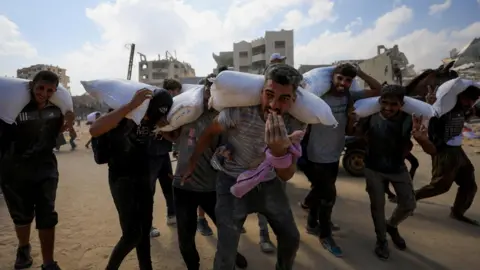In recent developments, the United Kingdom, alongside 27 other nations, has issued a compelling statement condemning Israel for what they describe as the “inhumane killing” of Gaza civilians who have been attempting to secure essential aid, such as food and water. The situation in Gaza, exacerbated by the ongoing conflict, has reached a critical juncture, with reports indicating that the death toll among Palestinians is alarmingly high, as a result of both violence and malnutrition. The collective voices of these nations represent a significant international response to the suffering endured by civilians trapped in the conflict.
The joint statement issued by the UK and these allied nations highlights a call for an immediate ceasefire in Gaza, emphasizing that the suffering of civilians has intensified to unprecedented levels. The criticism is directed particularly at Israel’s aid delivery model, which has been accused of being dangerous and systematically dehumanizing. This condemnation includes remarks regarding the “drip feeding” of aid, suggesting that the current approach is insufficient to address the humanitarian crisis unfolding in Gaza. Reports from the Hamas-run health ministry indicate that over 100 Palestinians met their deaths at the hands of Israeli fire while awaiting essential supplies during the weekend, alongside the disturbing statistic that 19 individuals succumbed to malnutrition.
In response to the international outcry, Israel’s foreign ministry dismissed these accusations, labeling them as “disconnected from reality” and arguing that such statements send an erroneous message to Hamas. The ministry contends that Hamas itself is spreading misinformation and obstructing efforts to distribute aid, instead of cooperating toward a ceasefire or a resolution regarding hostage situations.
International responses to Israel’s tactics in Gaza have been numerous, with various nations expressing their concerns over potential violations of human rights and humanitarian law since the onset of the conflict. This recent declaration stands out due to its forthrightness, as it unifies the foreign ministers of numerous prominent nations, including Australia, Canada, France, Italy, Japan, New Zealand, and Switzerland. The statement boldly asserts, “the war in Gaza must end now,” reflecting a global desire for an immediate resolution to the ongoing violence.
The statement goes on to characterize the conditions in Gaza as dire, noting that the current aid distribution model employed by Israel perpetuates instability and undermines the dignity of Gazans. It forcibly condemns the violence faced by civilians and emphasizes the humanity behind the statistics, mentioning that over 800 Palestinians have lost their lives while trying to seek aid. This is a stark portrayal of the daily struggles faced by the people of Gaza.
Continually updated reports from the conflict zone reveal that Palestinians are facing increasingly deadly conditions while awaiting assistance. The processes established by the Gaza Humanitarian Foundation (GHF) to allocate aid are criticized by the UN and humanitarian partners, who argue that these methods violate the foundational principles of impartiality and safety critical for humanitarian operations. The UN reported a staggering 674 killings in proximity to GHF aid sites, alongside the deaths of an additional 201 individuals in areas associated with UN convoy routes, demonstrating the tragic repercussions of the ongoing conflict.
Moreover, sentiments of despair are echoed by both medical professionals and civilians residing in Gaza. With hospitals unable to supply sufficient nourishment to their patients and families describing their struggles with hunger amid soaring prices for basic goods, the humanitarian crisis has become more acute. Reports indicate that malnutrition is spiraling, particularly affecting women and children. The humanitarian agency, World Food Programme, has described the crisis as having reached “new levels of desperation,” raising alarms about the urgent need for attention and intervention in Gaza.
Additionally, the international stance conveyed in the joint statement also tackles proposals suggested by Israeli officials to relocate the entire population of Gaza into designated zones, which has drawn sharp criticism as a violation of international humanitarian law to displace civilians forcibly.
As all parties face the dire consequences of this prolonged conflict, the call for a “permanent, unconditional, and immediate ceasefire” promises a pathway to healing and a new political resolution for lasting peace in the region.











